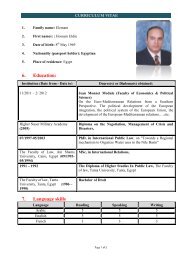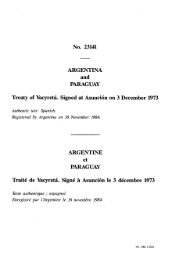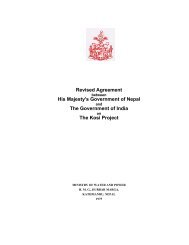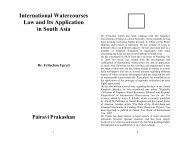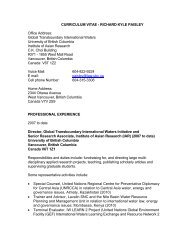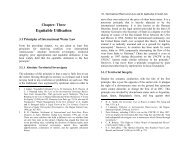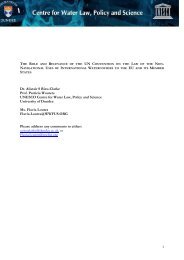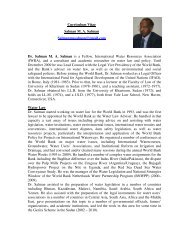Upreti, Trilochan, International Watercourses Law and Its Application ...
Upreti, Trilochan, International Watercourses Law and Its Application ...
Upreti, Trilochan, International Watercourses Law and Its Application ...
Create successful ePaper yourself
Turn your PDF publications into a flip-book with our unique Google optimized e-Paper software.
Equitable Utilisation / 103 104 / <strong>International</strong> <strong>Watercourses</strong> <strong>Law</strong> <strong>and</strong> <strong>Its</strong> <strong>Application</strong> in South AsiaChapter- ThreeEquitable Utilisation3.1 Principles of <strong>International</strong> Water <strong>Law</strong>From the preceding chapter, we can glean at least fourprinciples for resolving conflicts over internationalwatercourses: 1 absolute territorial sovereignty, territorialintegrity, prior appropriation <strong>and</strong> equitable utilisation, it hasbeen widely held that the equitable utilisation is the bestprinciple. 23.1.1 Absolute Territorial SovereigntyThe substance of this principle is that a state is fully free to usethe waters flowing through its territory as it pleases <strong>and</strong> it neednot pay heed to any restriction or prohibition on such use. Thisis the traditional view expressed by upstream states in order to1 J. Lipper, "Equitable Utilisation" in A. H. Garretson, R. D. Hayton &C. J. Omstead (eds), The <strong>Law</strong> of the <strong>International</strong> Drainage Basins,New York: Oceana Pub., 1967, pp.16-26; see O. McIntyre, "The <strong>Law</strong>Relating to the Use of Shared <strong>International</strong> Water Resources: 4 Toolsfor Equity" (1998) in 6 WI, Chancery <strong>Law</strong> Pub., pp. 23-24; also see M.Fitzmaurice, "Water Management in the 21st Century" in A. Anghie<strong>and</strong> G. Strurgess (eds), A Legal Vision of the 21st Century: Essays inHonour of Judge Christopher Weeramantry, the Hague: Kluwer <strong>Law</strong>,1998, pp. 427-429.2 B. R. Chauhan, Settlement of <strong>International</strong> <strong>and</strong> Inter-State WaterDisputes in India, Bombay: Indian <strong>Law</strong> Institute, 1992, pp. 21-40.There are some scholars who hold a different view on whether thereare only four rules on the subject. Chauhan has argued that there areseven prevailing rules, including the doctrine of riparian rights, priorappropriation, territorial sovereignty, natural flow, equitableapportionment, community of interest, <strong>and</strong> the equitable utilisationtheory.serve their own interest at the price of other basin states. It is anotorious principle that is heavily objected to by theinternational community. It is also known as the HarmonDoctrine, based on the legal opinion provided by the then USAttorney General to the Secretary of State in a dispute over thesharing of waters of the Rio-Gr<strong>and</strong>e River between the USA<strong>and</strong> Mexico in 1896. Neither the international community, northe United States itself, ever accepted this theory. Smith hastermed it as radically unsound <strong>and</strong> as a ground for legalityunaccepted. 3 However, its mention has been made by somestates; India in 1948, temporarily interrupting the flow of theriver from India to Pakistan; 4 China has asserted it even asrecently as 1997 during discussions on the UNCIW at theUNGA, 5 Austria made similar reference to the principle. 6However, it has never been a principle recognised by mostnations but rather heavily deplored for its basic foundation. 73.1.2 Territorial IntegrityDespite the semantic similarities with the title of the firstprinciple, this is just the opposite of the earlier rule. It pledgesthe right of a downstream state on the ground that upstreamstates cannot diminish, or change the flow of an IWC. Thisprinciple was invoked by downstream states such as Argentina,Egypt, Spain, Bangladesh, Syria, <strong>and</strong> Iraq against their3 H. A. Smith, The Economic Uses of Waters, London: P.K. King <strong>and</strong>Son, 1931, p. 8.4 J. Lammers, Pollution in <strong>International</strong> <strong>Watercourses</strong>, the Hague:Martinus Nijhoff, 1984, pp. 318-319.5 Press Release, including UNGA vote on the UNCIW 21 May 1997:www.un.org/law/ilc/texts/status.htm Gao Feng has said that the “statehad indisputable sovereignty over a watercourse which flowed throughits territory.”6 C. B. Bourne, “The Right to Utilize Water of <strong>International</strong> Rivers”(1965) in III CYBIL, p. 205.7 S. C. McCaffrey, "The Harmon Doctrine One Hundred Years Later:Buried, not Praised" (1996) in 36 NRJ, p. 725.



